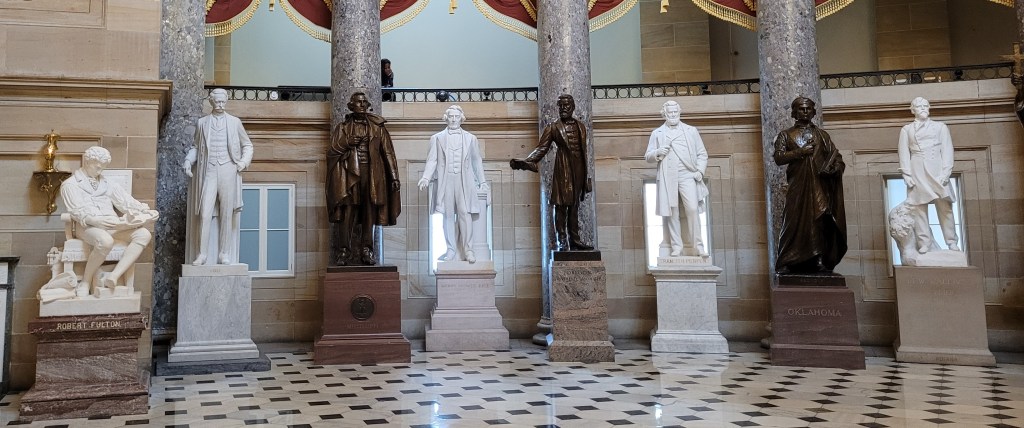
Many of the most admirable representatives in the U.S. Capitol today are made of marble or bronze.
The statues mostly depict long-dead white men — including two from Maine — but there are surprises, too, including likenesses of singer Johnny Cash, pilot Amelia Earhart and writer Willa Cather.

Not all of them deserve to be there. Take Jefferson Davis, president of the Confederacy, who is featured standing tall in coat and cape, as if he were a national hero … rather than a traitor.
Who is honored, in those halls, and who isn’t is a quirk of both history and lawmakers’ lassitude. I think it’s a decision every generation should get to make.
Back in 1864, as the Civil War raged and Mainer Hannibal Hamlin presided over the Senate as vice president, Congress decided the nation needed a “National Statuary Hall” that would showcase statues of Americans with “historic renown” or distinguished service.
The legislation provided that each state could send one or two statues for display within the U.S. Capitol.
Today, 99 statues are included in the collection. (There would have been 100 except Virginia pulled Confederate Gen. Robert E. Lee in 2020 — and hasn’t picked a replacement yet.)
Maine’s choices are remarkably conventional: Hamlin, who served as Abraham Lincoln’s first vice president, and William King, our first governor.
Congress installed a full-length bronze statue of Hamlin in 1935, complete with suit and opera cloak, cane and top hat — in all, a pretty natty dresser for a Mainer. King appears in marble, with another huge cloak, in a piece created by Maine sculptor Franklin Simmons.

In addition to Hamlin’s statue, outside the U.S. Senate chamber there’s also an 1889 marble bust by Simmons. Another bust, of former House Speaker Thomas Reed of Maine, can be found in a hallway near the U.S. House chamber.
Although the busts are going to stay where they are, Maine should give serious thought to replacing the two full-length statues.
Nothing against Hamlin or King, but times have changed. Wouldn’t it be more representative of Maine to have Margaret Wise Brown, Samantha Smith, LL Bean, Edmund Muskie, Robert McCloskey, Frances Perkins or Margaret Chase Smith?
There are plenty of other deserving souls; everyone will have their own ideas.
With the country’s 250th birthday approaching in 2026, this is a good time for Maine to bring King and Hamlin home.
Seventeen statues have already been replaced by other states over the years, with more bound to follow. Even Mississippi must someday realize that Davis shouldn’t be one of its choices.
While America’s diversity is missing in the statuary collection, some states are trying.
Nebraska offers interesting selections: writer Willa Cather and Standing Bear, chief of the Ponca tribe. I like Oklahoma’s, too: entertainer Will Rogers and Sequoyah, inventor of the Cherokee alphabet.
Despite its reputation as a liberal region, New England’s six states have picked 12 white, male politicians or soldiers as their choices. There’s not a single woman among them.
In fact, you have to go all the way to Indiana before you reach any state that’s honored a woman with a statue.
We can’t do anything about what other places do, but let’s pay tribute to more Mainers — and send a message about who we are — by sending new statues to Washington.
Who do you think Maine should honor?

We invite you to add your comments. We encourage a thoughtful exchange of ideas and information on this website. By joining the conversation, you are agreeing to our commenting policy and terms of use. More information is found on our FAQs. You can modify your screen name here.
Comments are managed by our staff during regular business hours Monday through Friday as well as limited hours on Saturday and Sunday. Comments held for moderation outside of those hours may take longer to approve.
Join the Conversation
Please sign into your CentralMaine.com account to participate in conversations below. If you do not have an account, you can register or subscribe. Questions? Please see our FAQs.